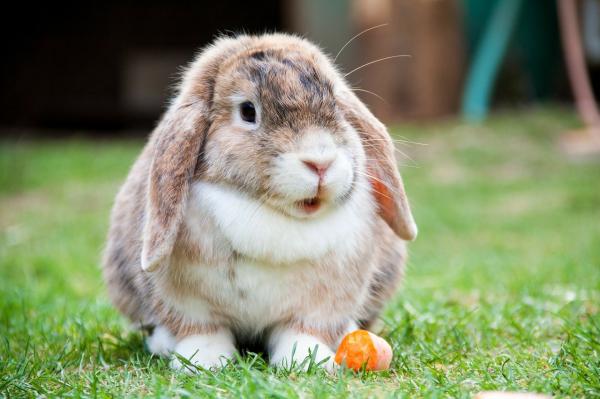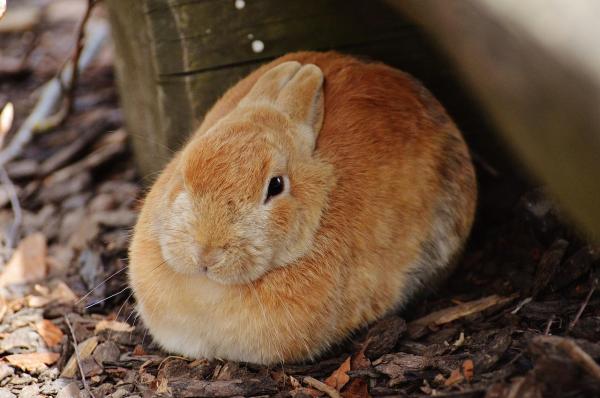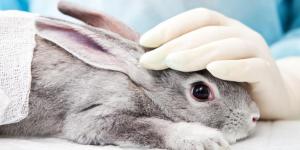Mastitis in Rabbits - Causes and Treatment



See files for Rabbits
While the vast minority consider cows and sheep to be pets, the same can't be said for rabbits. Rabbits are still widely used as a food source, they are involved in scientific research and yet are a very common pet across the world. Whatever situation they find themselves in, if they are under the care of humans they need the right care and attention to maintain their health.
Mastitis is an inflammation which affects different mammals, including rabbits. It is produced by a bacterium which can be contracted during the gestation period of the rabbit. It affects the quality of and access to the mother's milk. Such an infection puts the mother's health at risk, but, as the baby rabbit kits need to feed from their mother's breasts, they are equally in danger. AnimalWised brings you more information by discussing mastitis in rabbits and focusing on its causes and treatment.
What causes mastitis in rabbits?
Essentially, mastitis in an inflammation in the mammary glands of the rabbit. The cause is usually one of two strains of bacteria, either Staphylococcus or Streptococci. Specifically, the most common culprit is Staphylococcus aureus[1]. However, there are believed to be two main types of mastitis in rabbits:
- Sceptic mastitis: this is the kind caused by infection from bacteria. The lactating glands can become infected, but there is also a concern that the bacteria can spread to other parts of the body.
- Cystic mastitis: in the breast tissue of the rabbit, underneath the skin, cysts can develop. These may be otherwise benign, but after pregnancy, they can prevent the proper flow of milk during lactation. These cysts are related to those which may appear on other parts of the body. While they may begin benign, it is possible for them to develop into cancerous tumors[2].
Contraction of the infection is usually mitigated by certain factors. When a female rabbit is pregnant, hormone changes go on in their body. These hormones make the rabbit's mammary glands (located on the breast and around the nipple) become enlarged. Enlargement of the lactating glands is necessary for the baby rabbits (known as kits) to feed from them, but it can cause some problems which lead to blockages. If the milk cannot pass, then the kits will still try to feed. This can result in damage to the breast tissue and makes infection more likely.
If there are cracks in the mother's nipple, then the possibility of contracting mastitis is increased. Due to the open exposure, the bacteria can get into the wound. This is one of the many reasons why maintaining proper hygiene in your rabbit's hutch is so important. Immunodeficient rabbits may also be at a greater risk of contracting mastitis as their immune system is less able to fight infection. Also, some rabbits may be immunodepressed by a difficult pregnancy and/or birthing period. If the kits are teething on the nipples of the mother, they may be too aggressive. This can lead to injury to the gland and increase the likelihood of mastitis.
The cause of cystic mastitis may be a little more difficult to discern. There are many factors including parasitical infection, cellular deficiency or even genetic factors. Studies are lacking in rabbits for conclusive information about what causes these fluid filled cysts, but they are similar causes of any cyst.
Since hygiene is an important factor in contracting sceptic mastitis, there is greater risk to rabbits kept in large groups. Whether you have breeding rabbits at home or there is an outbreak in a rabbit farm[3], the spread of bacteria is greatly increased when more rabbits are together.

What are the symptoms of mastitis in rabbits
Detecting the symptoms of mastitis in rabbits is essential in stopping the infection or determining whether the mother rabbit is able to feed their kits. During the first hours and days after birth, we need to be particularly sensitive to problems with our rabbit. If the rabbit is unable to lactate properly, the baby rabbits will be unable to feed and their health is severely at risk.
During this period, carefully check the rabbit's breast for swelling, a higher than normal temperature, inflammation and reddish color in the area. Additionally, it is possible that the mother's mood declines and she does not want to eat or drink. As inflammation of the mammary glands due to infection is painful, the mother may refuse to feed the young as the pain is too great.
Mastitis is not only dangerous due to the pain and discomfort for the mother. If the kits are unable to feed from the mother, then they will not get the regular and vital nutrition they need to survive. If the mother perseveres and feeds the kits, then the milk they drink may be infected and the bacteria will be passed on the litter. If this occurs, it could be fatal due to the still developing immune system of the kits.
If the nipples and breasts of the mother rabbit show a purple or bluish color, the disease has progressed and the risk of death is greatly increased. Early detection of symptoms is essential and both mother and offspring should be taken to the vet for examination and testing.
Here are some specific symptoms of the two main types of mastitis in rabbits:
Sceptic mastitis:
- Weight loss (can be difficult to determine after pregnancy)
- Inflamed mammary glands
- Discoloration of nipples and breasts
- Excess thirst
- Dehydration
- Death of the kits
- Pain
Cystic mastitis:
- Fever
- Dehydration
- Weight loss
- Blood in urine
- Lumps in the breast tissue
Is the treatment available for mastitis in rabbits?
As stated above, the most important factor concerning mastitis in rabbits is early detection and diagnosis. This is both to prevent the spread of infection in mother and babies and to ensure the kits are cared for. At first sight of symptoms, you will need to go to the veterinarian immediately. Determining the type of mastitis may require blood tests, urinalysis or other types of diagnostic methods.
Treatment of sceptic mastitis in rabbits
The treatment of sceptic mastitis is similar to any other bacterial infection. They will likely be prescribed antibiotics, but this should last a maximum of 5 days and may need close monitoring by the veterinarian themselves.
Treatment of cystic mastitis in rabbits
As the cysts are blocking the flow of milk during lactation, the cysts will need to be removed. However, this will be determined after diagnosis. If the disease is chronic, then the surgical removal of the mammary glands (and the uterus if the cysts have spread) may be necessary. However, if the situation is relatively benign, the vet may not want to perform such an invasive procedure.
Feeding baby rabbits of a mother with mastitis
If a positive diagnosis of mastitis has been given, then the rabbits will not want to be fed by the mother. This is both because the milk they provide may not be nutritious enough and because you don't want the bacteria to be passed on. If this is the case, then you will need to find alternatives for feeding the kits. To do this, you can take a look at our article on how to feed baby rabbits. Do no let baby rabbits feed on the breasts of another healthy rabbit as this can spread the infection.

Can mastitis in rabbits be prevented?
To prevent the appearance of mastitis in rabbits, it is imperative you maintain the hygiene of their hutch or living area. This will prevent the proliferation of the bacteria which can infect mother and baby rabbits. This is especially important after the birth of the kits. Keep an eye, but also ensure you don't disturb the newborn rabbits too much.
Equally important is the general maintenance of their diet. Feeding them properly will help prevent disease by creating a strong immune system. This is particularly important not just to prevent mastitis, but for any pregnant rabbit.
This article is purely informative. AnimalWised does not have the authority to prescribe any veterinary treatment or create a diagnosis. We invite you to take your pet to the veterinarian if they are suffering from any condition or pain.
If you want to read similar articles to Mastitis in Rabbits - Causes and Treatment, we recommend you visit our Bacterial diseases category.







